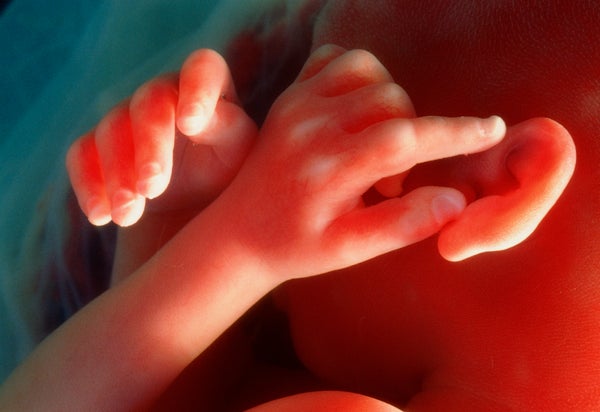About 60 to 70 percent of a person’s risk for schizophrenia depends on their genes. Most of us have some of the schizophrenia-associated genetic variants—single-letter changes in the DNA of genes scattered across our genome—and the more we have, the greater our risk. At the same time, scientists have known that complications during pregnancy, including viral infections in the mother, increase the fetus’s risk for developing schizophrenia by two-fold, but scientists have been unsure why.
New research published in Nature Medicine on May 28 reveals how when these two risk factors interact, the likelihood of an individual eventually being diagnosed with schizophrenia goes up at least five-fold compared to someone with a high genetic risk alone. Daniel Weinberger, director of the Lieber Institute for Brain Development in Baltimore and team discovered that roughly a third of the genes associated with schizophrenia are in the placenta. But certain variations in the DNA of these genes only result in schizophrenia if there are complications during pregnancy. The gene variants likely affect how resilient the placenta is to stress from its environment.
If the mother or baby experiences a major health complication during pregnancy, the variants could activate these genes in the placenta and induce inflammation or affect the fetus’s development, increasing the risk for schizophrenia later in life. “The placenta is the missing link between maternal risk factors that complicate pregnancies and the development of the fetal brain and the emergence of developmental behavioral disorders,” Weinberger says.
On supporting science journalism
If you're enjoying this article, consider supporting our award-winning journalism by subscribing. By purchasing a subscription you are helping to ensure the future of impactful stories about the discoveries and ideas shaping our world today.
“The findings are very intriguing,” says Alan Brown, a professor of psychiatry and epidemiology at Columbia University Medical Center who was not involved in the study. “To me the key thing in this paper is the recognition that environmental factors in early development, prenatal factors, are likely to be very important in schizophrenia and just as important as genes.”
To make this discovery, Weinberger’s team partnered with researchers in Italy, Germany, and Japan to study nearly 3,000 people—2,038 with schizophrenia and 747 without. They reviewed their genetic data and medical histories to look for pregnancy complications, such as preeclampsia (dangerously high blood pressure in the mother), restricted growth of the fetus, placental blockage of the birth canal, emergency Caesarean-sections, or the mother’s water breaking prematurely. These problems occur in an estimated 15 to 20 percent of all pregnancies.
The researchers then tested the large compendia of data assembled to look for statistical interactions between pregnancy complications and the genetic variations commonly associated with schizophrenia. Pregnancy complications were much more likely to result in schizophrenia when combined with genetic variants in the fetus that affect the placenta. Similarly, a high genetic risk was more likely to lead to schizophrenia if there had been a complication during pregnancy.Even if both the genetic risk and pregnancy complications are present, the likelihood of developing schizophrenia is still less than 15 percent—higher than the general population risk of under 1 percent, but far from a certainty.
Many of the implicated genes had long been thought to be involved in the development of the brain, but the new study shows they are actually expressed in the placenta. However, the genes could still indirectly affect the brain if the placenta is not healthy. Weinberger says researchers do not have a precise idea of what these genes are doing in the placenta, although it is thought that they may be involved in resilience to stress.
Placental health may also be a key influence in other neurodevelopmental disorders that have a strong genetic basis, such as autism, Tourette syndrome and ADHD. These conditions typically affect males more than females, but there is no clear reason why. In the new study, the schizophrenia-related genes were more likely to be expressed in the placenta for male rather than female fetuses, potentially bringing researchers one step closer to an answer about how sex influences risk.
A major question that has emerged from the research is how to prevent these types of severe pregnancy complications or make the placenta more resilient to stress. “Prevention is the holy grail in medicine. It’s much easier to prevent something than to cure it,” Weinberger says. “This may be the first strategy, we think, for trying to reduce the probability long before someone manifests these developmental disorders.”
